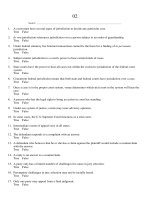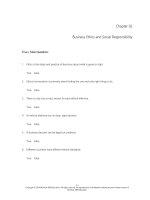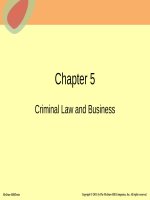- Trang chủ >>
- Thạc sĩ - Cao học >>
- Luật
Lecture Dynamic business law, the essentials (2/e) - Chapter 15: Sales and lease contracts
Bạn đang xem bản rút gọn của tài liệu. Xem và tải ngay bản đầy đủ của tài liệu tại đây (231.24 KB, 21 trang )
Chapter 15
Sales and Lease Contracts:
Performance, Warranties, and
Remedies
McGrawHill/Irwin
Copyright © 2013 by The McGrawHill Companies, Inc. All rights reserved.
The Basic UCC Performance
Obligation
• Sellers and lessors are obligated to transfer and
deliver conforming goods
• Buyers and lessees are obligated to accept and
pay for conforming goods in accordance with terms
of contract
• “Good faith” required in performance and
enforcement of every contract
152
“Good Faith”
• Definition: Honesty in fact
• In transaction between merchants, UCC also
imposes obligation of reasonable commercial
standards of fair dealing (“commercial
reasonableness”)
153
“Perfect Tender” Rule
States that if goods or tender of delivery
fail in any respect to conform to contract,
buyer/lessee has right to:
1) accept the goods;
2) reject entire shipment; or
3) accept part and reject part
154
Exceptions to “Perfect Tender” Rule
• Industry Standards
• Prior Dealings Between Parties
• Exceptions Outlined in Parties’ Agreement
• Seller’s/Lessor’s Right to Cure
• Destroyed Goods
• “Substantial Impairment”
• “Commercial Impracticability”
155
“Commercial Impracticability”
Doctrine
Delay in delivery or non-delivery may not, in
court’s discretion, constitute breach if performance
made impracticable because contingency has
occurred that was not contemplated when parties
reached agreement
156
Inspection, Rejection and Revocation of
Acceptance
• Seller/lessor must provide buyer opportunity to inspect
goods
• “Reasonableness” governs inspection process
• Post-inspection, buyer has option to accept, partially accept,
reject, or revoke acceptance
-UCC guidelines govern right to exercise particular options
post-inspection
• Buyers/lessees must give reasonable notice upon exercising
right of rejection/revocation of acceptance
157
Warranties
158
Warranty
Definition: Seller’s promise(s) regarding
certain characteristics of good(s) sold
159
“Express” Warranty Versus
“Implied” Warranty
• Express Warranty: Explicitly stated in
contract
• Implied Warranty: Automatically (by
operation of law) applied to contract
1510
Types of Warranties
Warranties of Title
• Passage of good title
• Implied promise of no liens/judgments against
title
• Implied promise that title not subject to claims of
intellectual property (copyright, patent, or
trademark) infringement
1511
Types of Warranties
Express Warranties
• Description of good’s physical nature or its use
• May be found in advertisements or brochures
• May be material term of contract
• Salesperson’s oral promise concerning good can
give rise to express warranty
• Buyer’s reliance on seller’s representations generally
means those representations become express
warranties, and part of contract
1512
Types of Warranties: Implied Warranties
• Implied Warranty of Merchantability (Definition): Warranty
based on reasonable expectation of product performance
• Good purchased must:
-Pass without objection in trade/market for similar goods
-Be of fair quality (within the product’s description)
-Be fit for “ordinary use”
-Have “even kind, quality and quantity”
-Be adequately packaged and labeled
-Conform to promises made on package/product label
1513
Types of Warranties: Implied
Warranties
Implied Warranty of Fitness For Particular Purpose
(Definition): Warranty that arises when seller knows
purpose for which buyer purchasing goods, and buyer
relies on seller’s judgment to recommend/select
certain product
Seller does not have to be merchant to make this
warranty
1514
Types of Warranties: Implied
Warranties
Implied Warranty of Trade Usage
(Definition): Warranty that arises as result of
generally-accepted trade practices
1515
Warranty Rights of Third Parties:
Third Party Beneficiaries of Warranties
Seller’s warranties may extend to:
• Buyer’s household members and guests
• Any “reasonable and foreseeable” user
• Anyone injured by good
1516
Warranty Disclaimers and Waivers
Methods of Disclaiming/Waiving Warranties:
• Seller does not make express warranties
• Seller disclaims implied warranties in clear,
unambiguous, conspicuous language
• Buyer fails/refuses to examine goods
• Buyer fails to file suit within applicable statute
of limitations period
1517
UCC Remedies Available to Seller/Lessor
When Buyer/Lessee In Breach of
Contract
•
•
•
•
•
•
Cancel Contract
Withhold Delivery
Resell/Dispose Of Goods
Sue to Recover “Benefit of Bargain”
Stop Delivery
Reclaim Goods
1518
UCC Remedies Available to
Buyer/Lessee When Seller/Lessor In
Breach of Contract
•
•
•
•
•
•
•
•
Cancel Contract
Obtain “Cover”
Sue to Recover Damages
Recover Goods
Obtain “Specific Performance”
Reject Non-Conforming Goods
Revoke Acceptance of Non-Conforming Goods
Accept Non-Conforming Goods and Seek Damages
1519
Liquidated Damages
• Definition: Damages identified before contract breach
occurs
• General Rule: Parties are free to negotiate a liquidated
damages contract clause
• General Rule: Courts will enforce liquidated damages
provisions, so long as they are non-punitive
• UCC Section 2-718: Allows non-breaching seller to
claim against breaching buyer 20% of purchase price or
$500, whichever is less, as liquidated damages
1520
Modifications/Limitations to Remedies
Otherwise Provided by the Uniform Commercial
Code
• General Rule: Parties to sales and lease contracts are
allowed to modify/limit remedies
• UCC Sections 2-719 and 2A-503 provide that parties are
allowed to create an agreement making it clear the remedies
outlined by their agreement are the exclusive remedies
available to them
• Courts generally uphold modifications/limitations to remedies
unless stipulated remedies “fail in their essential purpose”
1521









